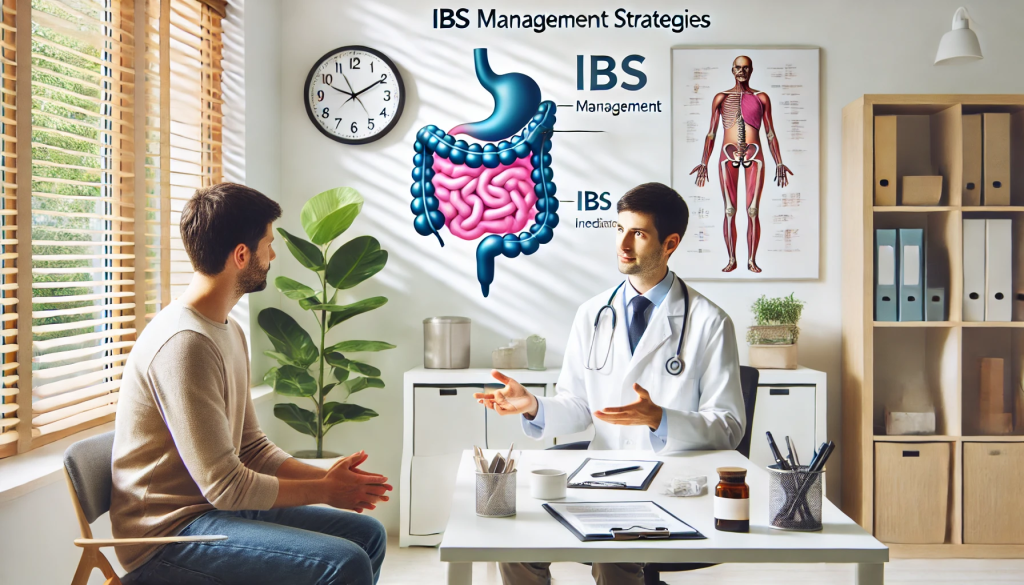Irritable Bowel Syndrome (IBS) is a chronic functional disorder of the gastrointestinal tract characterized by abdominal discomfort or pain, altered bowel habits, and other symptoms. This condition is not associated with structural damage and often requires a comprehensive treatment approach.
1. Main Symptoms of Irritable Bowel Syndrome
- Abdominal pain: Often accompanied by cramps that improve after bowel movements.
- Altered stool patterns: Constipation, diarrhea, or a combination of both.
- Bloating: Increased gas and a feeling of heaviness.
- Incomplete evacuation: A persistent feeling of discomfort after using the bathroom.
2. Causes of IBS
- Stress and emotional factors: IBS often develops against the background of chronic stress and anxiety.
- Intestinal motility disorders: Uncoordinated muscle contractions of the intestinal wall lead to symptoms.
- Hormonal changes: Women often experience worsened IBS symptoms during menstruation.
- Dietary triggers: Fatty, spicy foods, caffeine, and alcohol can exacerbate the condition.
3. Diagnosis of Irritable Bowel Syndrome

- Exclusion of other diseases: Blood tests, stool analysis, endoscopy, and other tests help rule out organic pathologies.
- Rome Criteria: Diagnosis is based on symptoms such as abdominal pain associated with bowel movements and changes in stool frequency or form.
4. Treatment of IBS
- Dietary adjustments: Avoid irritant foods, include fiber, and maintain proper hydration.
- Stress management: Meditation, yoga, and cognitive-behavioral therapy help alleviate symptoms.
- Medications: Antispasmodics, probiotics, and remedies for constipation or diarrhea.
- Physical activity: Regular exercise improves bowel motility and overall well-being.
5. Prevention and Lifestyle

- Maintain a healthy diet and avoid overeating.
- Manage stress using relaxation techniques.
- Stay hydrated and avoid dehydration.
Conclusion
Irritable Bowel Syndrome requires attention to lifestyle, diet, and emotional health. Timely diagnosis and a comprehensive treatment plan can significantly improve quality of life and manage symptoms.
Irritable Bowel Syndrome (IBS): Causes, Symptoms, and Management
Irritable Bowel Syndrome (IBS) is a common gastrointestinal disorder that affects the large intestine. It is characterized by a group of symptoms, including abdominal pain, bloating, and changes in bowel habits such as diarrhea or constipation. While IBS does not cause permanent damage to the digestive tract, it can significantly impact a person’s quality of life. Understanding the causes, symptoms, and treatment options can help manage this condition effectively.
What Is IBS?
IBS is a functional gastrointestinal disorder, meaning it affects how the gut works rather than causing structural damage. It is a chronic condition that can vary in severity and may worsen during times of stress or after consuming certain foods. There are three primary types of IBS based on predominant symptoms:
- IBS with Diarrhea (IBS-D): Frequent loose or watery stools.
- IBS with Constipation (IBS-C): Hard, infrequent stools or difficulty passing stool.
- IBS with Mixed Symptoms (IBS-M): Alternating episodes of diarrhea and constipation.
Causes of IBS:
The exact cause of IBS is not fully understood, but several factors are believed to contribute:
- Gut-Brain Interaction: Abnormal communication between the brain and the gut may disrupt normal digestive processes.
- Gut Motility Issues: Irregular muscle contractions in the intestines can lead to symptoms like diarrhea or constipation.
- Hypersensitivity: People with IBS may have heightened sensitivity to normal intestinal activity, causing pain or discomfort.
- Gut Microbiota Imbalance: Changes in the composition of gut bacteria may play a role in IBS development.
- Triggers: Stress, hormonal changes (such as during menstruation), and certain foods can exacerbate symptoms.
Symptoms of IBS:
IBS symptoms vary from person to person but commonly include:
- Abdominal pain or cramping, often relieved by bowel movements.
- Bloating or a feeling of fullness.
- Changes in stool consistency and frequency (diarrhea, constipation, or both).
- Mucus in the stool.
- Sensation of incomplete bowel emptying.
Symptoms may come and go and are often triggered by specific foods, stress, or other factors.
Diagnosing IBS:
There is no specific test for IBS. Diagnosis is typically based on symptoms and by ruling out other conditions, such as inflammatory bowel disease (IBD) or celiac disease. A healthcare provider may use criteria such as the Rome IV criteria, which focus on recurrent abdominal pain associated with bowel movement changes. Blood tests, stool tests, or imaging studies may be conducted to exclude other causes.
Managing IBS:
Treatment for IBS focuses on relieving symptoms and improving quality of life. This often involves a combination of dietary changes, stress management, and medications:
- Dietary Modifications:
- Low FODMAP Diet: Reducing foods high in fermentable carbohydrates (like onions, garlic, and beans) can alleviate symptoms for some people.
- Fiber Intake: Soluble fiber, found in foods like oats and psyllium, can help manage constipation, while insoluble fiber may worsen symptoms for some.
- Identify Trigger Foods: Common triggers include spicy foods, caffeine, alcohol, and dairy. Keeping a food diary can help pinpoint problematic items.
- Medications:
- Antispasmodics: These medications reduce intestinal spasms and alleviate pain.
- Laxatives or Antidiarrheal Agents: Used to manage constipation or diarrhea, respectively.
- Probiotics: Some strains of probiotics may improve gut health and reduce symptoms.
- Prescription Medications: Drugs like lubiprostone or linaclotide can be prescribed for IBS-C, while rifaximin may be used for IBS-D.
- Stress Management:
- Stress often exacerbates IBS symptoms. Techniques such as mindfulness meditation, yoga, or cognitive behavioral therapy (CBT) can help manage stress and reduce symptom severity.
- Regular exercise, like walking or swimming, can improve digestion and mental well-being.
- Hydration:
- Drinking plenty of water is essential, especially for individuals with IBS-C, to help prevent dehydration and support bowel regularity.
When to See a Doctor:
While IBS is not life-threatening, certain symptoms require medical attention. Seek immediate care if you experience:
- Unexplained weight loss.
- Blood in stool.
- Severe or persistent abdominal pain.
- Symptoms that start after age 50.
Living with IBS:
IBS is a chronic condition, but many people find that symptoms can be effectively managed with the right approach. Building a support system, joining IBS support groups, or seeking counseling can help cope with the emotional impact of living with this condition.
In conclusion, IBS is a manageable disorder that requires a personalized approach. By identifying triggers, making dietary changes, and implementing stress-reduction techniques, individuals with IBS can significantly improve their quality of life.

















Pingback: Stomach Pain: Causes and Recommendations - Medhouse.info